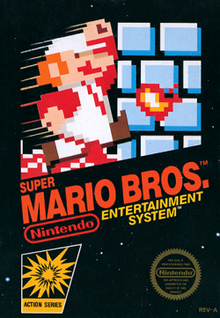
Back Super Mario Bros. AN سوبر ماريو برذرز Arabic سوبر ماريو بروس ARZ Super Mario Bros. Azerbaijani Super Mario Bros. Byelorussian Super Mario Bros. Bulgarian Super Mario Bros. BS Super Mario Bros. Catalan Super Mario Bros. CEB سووپەر ماریۆ برۆس CKB
| Super Mario Bros. | |
|---|---|
 North American box art | |
| Developer(s) | Nintendo R&D4 |
| Publisher(s) | Nintendo |
| Director(s) | Shigeru Miyamoto |
| Producer(s) | Shigeru Miyamoto |
| Designer(s) |
|
| Programmer(s) |
|
| Artist(s) |
|
| Composer(s) | Koji Kondo |
| Series | Super Mario |
| Platform(s) | Nintendo Entertainment System, arcade |
| Release | NES Arcade |
| Genre(s) | Platform |
| Mode(s) | Single-player, multiplayer |
| Arcade system | Nintendo VS. System |
Super Mario Bros.[b] is a 1985 platform video game developed and published by Nintendo for the Nintendo Entertainment System (NES). It is the successor to the 1983 arcade game Mario Bros. and the first game in the Super Mario series. It was originally released in September 1985 in Japan for the Family Computer; following a US test market release for the NES, it was converted to international arcades on the Nintendo VS. System in early 1986. The NES version received a wide release in North America that year and in PAL regions in 1987.
Players control Mario, or his brother Luigi in the multiplayer mode, to traverse the Mushroom Kingdom in order to rescue Princess Toadstool from King Koopa (later named Bowser). They traverse side-scrolling stages while avoiding hazards such as enemies and pits with the aid of power-ups such as the Super Mushroom, Fire Flower, and Starman.
The game was designed by Shigeru Miyamoto and Takashi Tezuka as "a grand culmination" of the Famicom team's three years of game mechanics and programming, drawing from their experiences working on Devil World and the side-scrollers Excitebike and Kung Fu to advance their previous work on platforming "athletic games" such as Donkey Kong and Mario Bros. The design of the first level, World 1-1, is a tutorial for platform gameplay.
Super Mario Bros. is frequently cited as one of the greatest video games of all time, and is particularly admired for its precise controls. It has been re-released on most Nintendo systems, and is one of the best-selling games of all time, with more than 58 million copies sold worldwide. It is credited alongside the NES as one of the key factors in reviving the video game industry after the 1983 crash, and helped popularize the side-scrolling platform game genre. Koji Kondo's soundtrack is one of the earliest and most popular in video games, making music a centerpiece of game design and has since been considered one of the best video game soundtracks of all time as a result. Mario has become prominent in popular culture, and Super Mario Bros. began a multimedia franchise including a long-running game series, an animated television series, a Japanese anime feature film, a live-action feature film and an animated feature film.
- ^ "The history of Super Mario". Nintendo. Archived from the original on February 1, 2021. Retrieved February 17, 2021.
Released: Oct. 18, 1985
Cite error: There are <ref group=lower-alpha> tags or {{efn}} templates on this page, but the references will not show without a {{reflist|group=lower-alpha}} template or {{notelist}} template (see the help page).